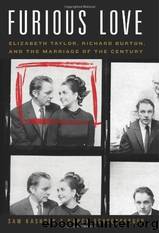Furious Love: Elizabeth Taylor, Richard Burton, and the Marriage of the Century by Kashner Sam

Author:Kashner, Sam [Kashner, Sam]
Language: eng
Format: epub
Tags: Biography
ISBN: 9780061562846
Barnesnoble:
Goodreads: 7625089
Publisher: HarperCollins
Published: 2010-01-01T00:00:00+00:00
In September, the couple flew to Paris and checked into the Plaza Athénée, so Burton could begin filming an unconventional movie called Staircase, directed by Stanley Donen. In this movie, Burton and his good friend Rex Harrison played a pair of aging homosexuals. It seemed an unusual choice to take on such challenging fare, after the twin horrors of Ifor’s paralysis and Elizabeth’s hysterectomy, and he found himself having to explain it to the press. Like a man going through customs, Richard had to publicly declare that he wasn’t homosexual—“I tried it once,” he admitted with remarkable candor at the time.
When he was sixteen, Richard had been taken by Emlyn Williams to a party where he quickly noticed that all the guests were gay men, some of whom made passes at him. “What could I say? What could I do? I mean, these were some of the greatest actors in the English theater. I wasn’t gay, but it was hard to say no,” he wrote about the incident. Later, when he was receiving his six-month course of Royal Air Force (RAF) training at Exeter College, Oxford, he was the only RAF officer trainee who finagled a single room for himself, possibly arranged by Philip Burton (who, as commanding officer of Port Talbot Squadron 499, had gotten Burton the opportunity to begin with). One day, when the RAF trainees were parading in formation on the Oxford grounds, Richard was commanded to step forward. He was pulled out of line and reprimanded for “entertaining an officer in his room.” That he wasn’t drummed out of the corps was probably due to the influence of his commanding officer—Philip Burton—but Richard recalled it as a particularly humiliating incident, especially for the son of a Welsh miner.
Elizabeth, though, had helped him overcome any shame he might have still harbored. Now, here was a chance to portray the pathos of a gay man living in England at a time when homosexuality was considered a crime. It also offered him a chance to confront his past, and Elizabeth gave him the courage to do so.
Burton announced to the press that he’d accepted the part because Rex Harrison had said, “I will if you will.” Elizabeth had urged him to take on the role, given her affection for her many gay friends—Roddy McDowall, Dick Hanley, John Lee, Montgomery Clift, Rock Hudson, Vincente Minnelli, Franco Zeffirelli—and her belief in the film’s affirmation of the healing power of love, no matter the orientation. With Elizabeth’s help, Richard had become more able to accept his early sexual experiences, and appearing as a gay barber—although sometimes slipping into parody—reflected that self-acceptance. One would have a hard time imagining other actors of his stature at the time—John Wayne, Frank Sinatra, Paul Newman, George C. Scott—taking on an overtly gay role.
Even after a string of poorly performing films, the Burtons still had the clout to demand their highest salaries to date—$1.25 million each—for Burton to appear in Staircase and, for Elizabeth, The Only Game in Town, both for 20th Century-Fox.
Download
This site does not store any files on its server. We only index and link to content provided by other sites. Please contact the content providers to delete copyright contents if any and email us, we'll remove relevant links or contents immediately.
| Military | Political |
| Presidents & Heads of State | Religious |
| Rich & Famous | Royalty |
| Social Activists |
Waking Up in Heaven: A True Story of Brokenness, Heaven, and Life Again by McVea Crystal & Tresniowski Alex(37004)
Empire of the Sikhs by Patwant Singh(22173)
We're Going to Need More Wine by Gabrielle Union(18074)
Hans Sturm: A Soldier's Odyssey on the Eastern Front by Gordon Williamson(16636)
Leonardo da Vinci by Walter Isaacson(11903)
The Radium Girls by Kate Moore(10907)
Educated by Tara Westover(7063)
Tools of Titans by Timothy Ferriss(6950)
How to Be a Bawse: A Guide to Conquering Life by Lilly Singh(6693)
The Last Black Unicorn by Tiffany Haddish(5075)
Permanent Record by Edward Snowden(4999)
The Rise and Fall of Senator Joe McCarthy by James Cross Giblin(4845)
Promise Me, Dad by Joe Biden(4449)
The Wind in My Hair by Masih Alinejad(4424)
The Crown by Robert Lacey(4105)
A Higher Loyalty: Truth, Lies, and Leadership by James Comey(4033)
The Iron Duke by The Iron Duke(3639)
Joan of Arc by Mary Gordon(3259)
How to be Champion: My Autobiography by Sarah Millican(3186)
